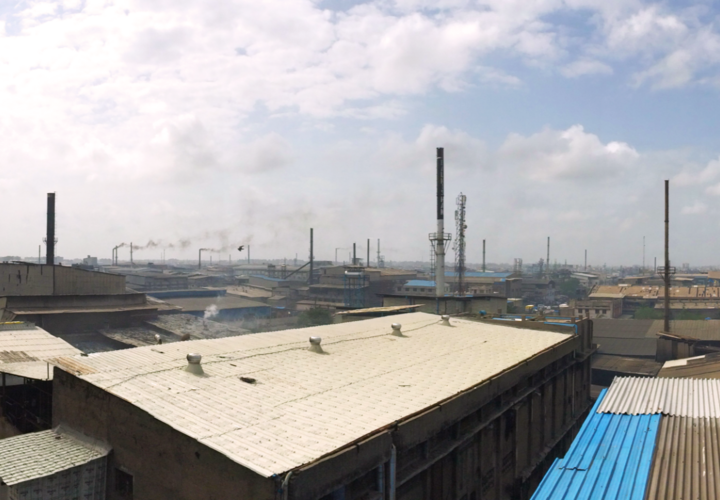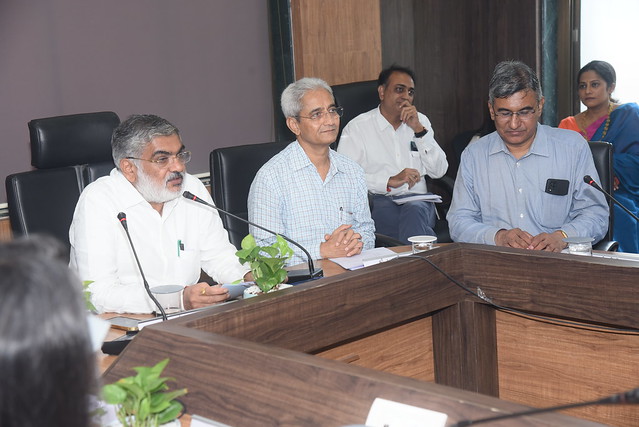Gujarat opens emissions market in Ahmedabad, building on collaboration with EGC
Live trading of an Emissions Trading Scheme (ETS) in Ahmedabad, a city of 8 million, was launched by the Minister of Forests and Environment of the state government of Gujarat. This makes Ahmedabad India’s second city to implement an ETS for particulate pollution.

Emissions Trading Scheme launched in Ahmedabad
Gujarat has taken a momentous step in curbing industrial emissions and pollution across the state by initiating an Emissions Trading Scheme (ETS) for particulate matter pollution in its most populous city, Ahmedabad. The emissions market is being implemented by the Gujarat Pollution Control Board (GPCB). GPCB has been advised in the design of this new market by EGC affiliates Rohini Pande and Nicholas Ryan, and co-researchers Michael Greenstone and Anant Sudarshan, with support from the Energy Policy Institute at the University of Chicago (EPIC) and J-PAL South Asia.
In inaugurating the ETS Ahmedabad Live Market, Shri Mulubhai Bera, the Honorable Minister of Forests and Environment, Government of Gujarat, said, “Gujarat has been a flagbearer of taking innovative initiatives to ensure a balance between economic development and environment preservation. The Emissions Trading Scheme for Particulate Matter, the first in the world for PM emissions, is one of the examples of the unique initiatives being taken by the Government of Gujarat to contain its emissions.”
Particulate matter air pollution is a danger to human health and shortens the lives of many Indian citizens. Most large cities in India are out of compliance with the National Ambient Air Quality Standards for particulate matter. The emissions market is a tool to help bring cities into compliance and safeguard human health. Ahmedabad joins the city of Surat (population 7 million) as the second location in the state of Gujarat to adopt the ETS policy tool to improve air quality. Surat’s ETS was launched in 2019 and was the world’s first pollution market for particulate matter. The long-running research collaboration with GPCB has yielded a wealth of research on environmental policy relevant to low- and middle-income countries (LMICs), including plans for a carbon market in Gujarat.
The development and implementation of the Surat ETS proves that private industries, regulators, and a private trading platform can work together effectively to implement cutting-edge pollution markets in emerging economies. The regulator has an effective mechanism to hit credible pollution targets; industries find that they can modernize more efficiently when they have a choice whether, when and how to invest, with the option of buying or selling permits on the market.
- Rohini Pande, Henry J. Heinz II Professor of Economics at Yale and the Director of EGC
At the launch ceremony, GPCB Chairman Shri R B Barad congratulated the team for this timely launch. “Beginning trading in Ahmedabad’s pollution market is a watershed moment for us,” he said. “This innovative market mechanism will help control the state’s industrial emissions and help citizens breathe clean air. Gujarat has always made progressive efforts to balance growth and environmental needs, and Ahmedabad’s emission trading scheme is one more giant step in that direction.”
Participating industries have actively taken part in mock trading exercises over the past five months, acquainting themselves with the trading platform developed by NeML, a private-sector software developer. This preparatory phase has enabled industries to grasp the intricacies of online permit trading using virtual currency. The initial phase of the Ahmedabad ETS encompassed crucial activities, including installing and calibrating Continuous Emissions Monitoring System (CEMS) devices across participating industries, coupled with multiple workshops to simulate trading scenarios.
The ETS pilot in Surat achieved the rare win-win of reducing industries’ costs and decreasing pollution emissions, fostering faster economic growth and clean air. With the launch of trading in Ahmedabad’s pollution market, Gujarat has again taken another leap in advancing evidence-based policymaking that sets it apart internationally.
- Michael Greenstone, the Milton Friedman Distinguished Service Professor in Economics at the University of Chicago and Director of EPIC, who also participated in the launch event
The State Pollution Control Boards are always making efforts to find sustainable solutions to address the issue of pollution. GPCB’s collaboration with leading research centers to introduce markets, backed by rigorous scientific research, has the potential to benefit the regulator, regulated and most importantly, the public.
- Shri Sanjeev Kumar IAS, the Honorable Principal Secretary, Forests and Environment Department, Government of Gujarat
As an innovative instrument for pollution regulation, the Emissions Trading Scheme has the potential to transform the trade-off between environmental quality and growth and improvement in air quality.
This article is adapted from a press release produced by EPIC India.
